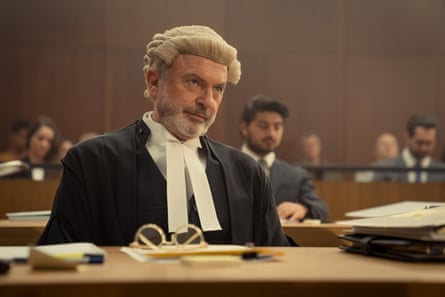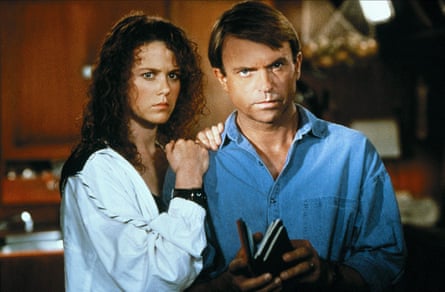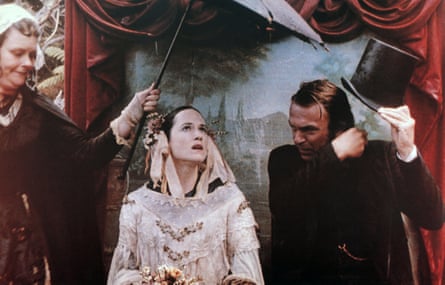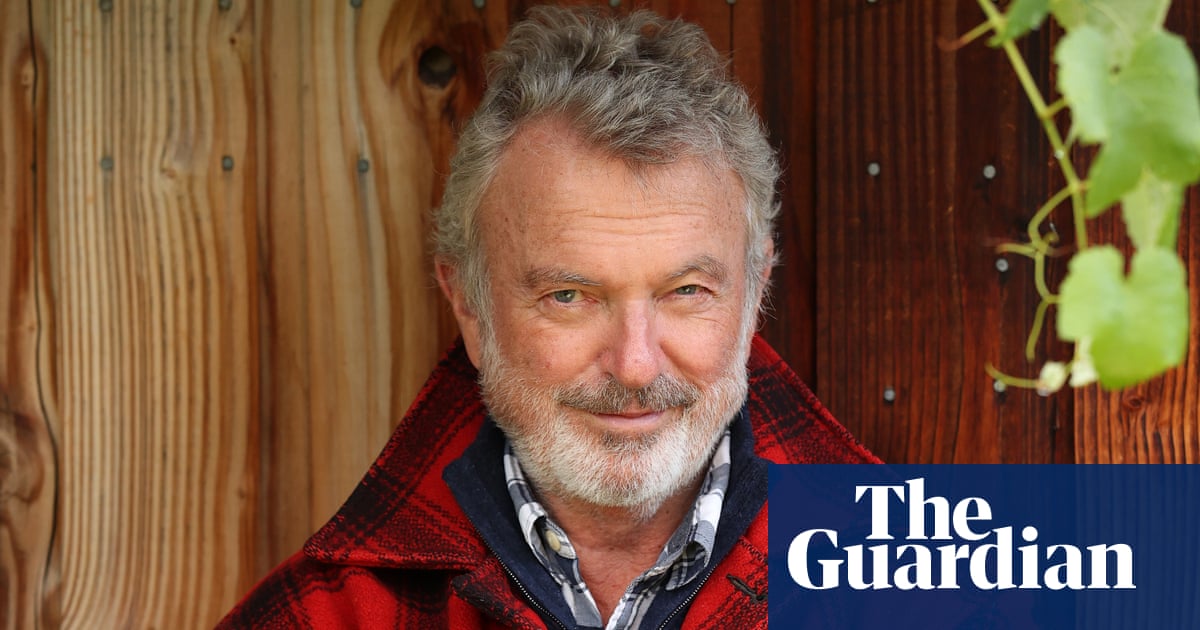He is one of the world’s best actors – but can still go to Starbucks without anyone recognising him. He discusses cancer, remission, happiness, fame and video nasties
Sam Neill, 76, is speaking to me via Zoom from Vancouver, where he is filming Untamed, a new Netflix series. We’re here, though, to discuss the new season of The Twelve, a pacy Australian courtroom drama in which Neill plays barrister Brett Colby SC. It’s a heightened murder mystery and subtle social commentary, and “the second series is considerably stronger than the first”, he says, rightly and also surprisingly, because it’s a little bit like saying the first season wasn’t very good. But then, he’s done enough time in this business that he’s allowed to say what he likes, within reason.
For instance, he doesn’t especially like the modern blockbuster: “Now we’re in the age of Marvel action films, people destroying entire cities on a whim, they’re not particularly interesting to me.” (But that didn’t stop him making cameos in the two most recent Thor films, directed by fellow New Zealander Taika Waititi.) Or that “the great years of cinema were the 50s through to the 70s”, which is, again, surprising, since in a career spanning 45 years, the golden age tapped out (according to him) after his fourth film in 1979, My Brilliant Career. This was an absolutely epochal feminist masterpiece, which anyone of a certain vintage – 50 – will remember because of how many times their mum made them watch it. “It was a film about women, made by women, and that was almost unheard of then. And rare enough today,” he says. If you run the numbers, how many female antipodean directors made it big in the 20th century, and how many cast Neill as their leading man, you come back with “both of them” (Gillian Armstrong and, of course, Jane Campion with The Piano, in 1993). When feminists all (both) like the same guy, it’s usually because he’s not a dick.

It’s only a year since his memoir, Did I Ever Tell You This?, revealed that he had stage-three blood cancer, from which he is now in remission, and he’s been working like a dervish ever since. The book itself was written pell-mell, because, “The truth was, I didn’t know how long I had to live. What I had was aggressive. I thought I’d better scribble down some stuff before I shuffle.”
He was “stuck in Sydney, getting chemo, I had nothing else to do, and the idea of having nothing to do was unbearable”.
Like Neill himself, the book is charming – he says the cancer (angioimmunoblastic T-cell lymphoma) was its organising framework, but it was more memorable for the quality of self-deprecation which characterises his speech. “As an idle man, I seem to work a lot, but basically I’m an idler, I’m not sure I have the application …” he begins, before scurrying off to find something. His look is urbane and unruffled, a kind of clean living James Mason, but his manner is enthusiastic and boyish, and he often makes a point with an object, as if he’s at a primary school show-and-tell. Ah, he’s back with a different book entirely (Question 7, by the Booker-winning author Richard Flanagan). “If I was a man of a little more profundity, or any profundity, and I didn’t write my book in a hurry, if it wasn’t for those two things – but the hurry was of necessity – and if I had more of a brain, I would have written this.”
Back to The Twelve: in another life, he says, he would have been a barrister – he did one year of law at university, “which was catastrophic”. Partly for the regular reasons – he spent too much time doing plays and chasing girls – but mainly because it was “incredibly tedious. For one of the most interesting jobs in the world, it is taught in the most boring way. Just learning things by rote. I just thought, ‘What the hell is this?’ I cannot entirely blame myself, but yes, I was lazy.” I float the theory that they teach law boringly on purpose, to filter out the wrong people; it’s all very well to be a showoff, but you also need to be quite diligent. “I’ve never been accused of diligence, that’s for sure.”
His character in The Twelve is an effortless legal genius in court, an understated Romeo outside it, having a long-range affair with another barrister, Meredith, played by Frances O’Connor. While there’s a more combustible love-hate story at the centre of the drama, Neill is arguably its romantic lead. Was he surprised to find himself there? Again? He scoffs at that. “I don’t think there’s anything romantic about it. Colby is, shall we say, getting lucky. It happens once a year, they go on circuit, I think it’s been going on for seven years or something. Otherwise they have no contact. It’s a very grownup arrangement.”

Choosing this show hints at a deep loyalty to the Australian and New Zealand film scene, which has been evident throughout Neill’s career; the reason he was cast in Jurassic Park was that Spielberg had seen him in Dead Calm in the late 80s. That launched Nicole Kidman internationally, but Neill had already made the third Omen film, The Final Conflict, some years before, and was on his way. But he never wanted to move to Hollywood. “A number of reasons. One was, I didn’t want to bring up my children in LA. I didn’t think that would be good for them.” He has a son with the actor Lisa Harrow – Tim, born in 1983 – and a daughter, Elena, born in 1991, with the makeup artist Noriko Watanabe, who he married in 1989 (they separated in 2017). Did he worry they’d end up spoiled? “More spoiled,” he says. Such a dad joke. “And I didn’t love LA. I really didn’t like living there. We went there for a year and a half and I wasn’t happy. There was nothing but show business. No other conversations, no other interests. It bores the shit out of me. That’s why my life now is half performance and half rural. I farm, I grow wine, and that keeps me sane. If I was only doing one, I’d go absolutely nuts.”
If New Zealand now keeps him sane, it was a hardscrabble job making a name from there in the 70s. His parents had emigrated with him from Northern Ireland. “I sometimes think about my mother, who never complained about anything in her life. I don’t think, when she signed up to marry Dad, that she imagined she’d be halfway across the world and have to leave her mother and all her friends, and start again. But I was seven years old; I didn’t know any different.” Raised on British and American films – “gentlemanly actors, I was drawn to them” – the scene simply didn’t exist for him to do what he wanted to do. He says, probably with a bit of hyperbole but not much, that there were only five actors making a living from it in New Zealand, and most of that was in radio plays. “The idea of having a career in film at all was completely unrealistic. And it was film that interested me.”
When he shot his first feature, Sleeping Dogs, in 1976, it was the first ever 35mm film to be produced entirely in New Zealand, and the first New Zealand film to open in the US. “I wasn’t a full-time actor until I was 30, which is quite late.” On his first trip to Europe, he was on the same plane as David Niven, a lifelong hero. “I was much too shy and nervous to say hello, but people were coming up from everywhere. I’m sure he just wanted to be left alone. But he was so courteous and delightful to each and every one of them. I thought, that’s a lesson, right? That you treat people with proper civility even when you don’t feel like it. He was wonderful.”

Neill’s own politeness has never been tested by any hysteria, he insists, because “being a celebrity and being an actor are two separate jobs. I would rate myself as a reasonably successful film and television actor. I don’t rate myself as a film star. I can go to Starbucks, no one bugs me,” and off he goes to get his Starbucks cup. It’s gigantic, and has his name on the side. “I tell them my name! They don’t know me. I’ve got friends who are really famous and I wouldn’t have their lives for anything.”
This is, no question, the secret of a happy life; he often runs the counter-factual out loud, and concludes things are better the way they are. “What would have happened if I’d stayed in England? Would I have become an actor? Would I have had to go from one dreary repertory company to another, as a really third-rate Shakespearean actor? I’ve no idea.”
He was made an arts icon of New Zealand in 2020 (this is a big deal; there can only be 20 living icons at any one time), but the only honour he mentions, with a kind of amused bafflement, is one from the Sitges film festival the year before, which lauded his lifetime services to sci-fi. It was Jurassic Park, mainly, plus a couple of John Carpenter films (In the Mouth of Madness; Memoirs of an Invisible Man), but it was also a 1981 film, Possession, that seemed to unite his passions – for cosmopolitan, low-budget cinema and for a storytelling excess with which one probably wouldn’t associate him. “It’s very extreme: it’s somewhere between arthouse, horror and action film, I don’t know where it quite lies. It’s very Polish and very brave, and Isabelle Adjani is astonishing in it. I was asked to go to places I’d never been asked to before, and certainly not since. It was straight after the Omen, and I found myself right in the middle of extreme arthouse European cinema. I couldn’t have been happier.” Adjani won best actress at Cannes for it, and it’s still a cult classic, but it was “maltreated in England, as a ‘video nasty’ – do you remember those?”. It’s quite an insight into Neill’s range, this film; if you were to describe his screen presence, you’d lead on that gentlemanly quality that appealed to him from the start. But Possession is not gentlemanly at all, it is absurd. The performances are brilliant.
There was a world-outpouring of concern and well-wishing when Did I Ever Tell You This? was published, which he found “very, very touching”, but as philosophical as he is in the book, about mortality and all that, he had an almost superstitious determination to get back on the horse as soon as possible, and hardly took any time off work. “No, that would have been giving up. My first job back, I was so thrilled to be back. I had some qualms, obviously. Did I have the energy? Would I have the stamina? I didn’t know, but we got through it and all was well.”
He says he has one more show to film before Christmas (it’s already August, I point out kindly; that’s basically a year’s non-stop work), and loves the modern status of TV. “When I was starting out, if you were a film actor, you didn’t touch television. It was like getting a communicable disease – no one wanted to touch you if you’d been contaminated by television.” He worries about the future of the film industry, and misses the era when “people running studios really wanted to make good movies. They weren’t so much interested in making hundreds of millions, or ideally billions, of dollars. They were just making movies; that’s rare these days.”

But he’s never fallen out of love with the work, the execution of it and the being asked to do it in the first place. “I probably work more than I should, but that’s because I enjoy it so much. The idea of not working fills me with dread. Some of it is to do with coming from a little place, the most obscure place in the world, as far from anything as you could get, and being asked to do something with an international dimension. How immensely seductive is that?”
The second series of The Twelve will stream on ITVX exclusively from Thursday 15 August, and is streaming on Binge in Australia

